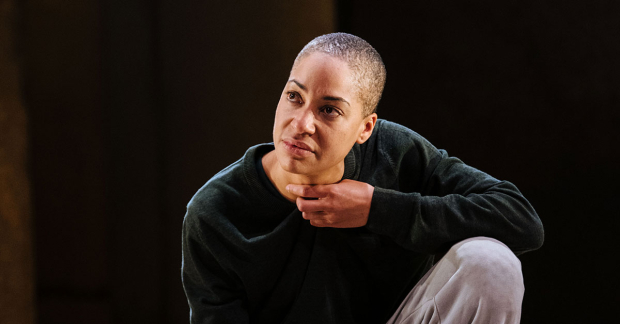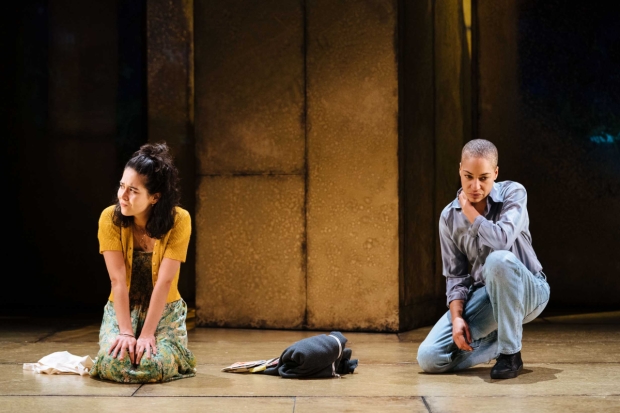Hamlet at the Young Vic review – Cush Jumbo's long-awaited Dane arrives
Greg Hersov directs the new production

© Helen Murray
What a curious production this is! It has moments of utter brilliance, a compelling Hamlet and one of the best Ophelias I have ever seen. It also has its problems. Perhaps the fairest summary I can offer is that in three hours I wasn't bored. Though I was sometimes reeling.
At the heart of everything is Cush Jumbo's performance as Shakespeare's sweet prince. From the moment The Good Wife star – the first Black woman to take on the role in a major UK production – appears, effortlessly androgynous, with shaven head, and loose-fitting black suit, you never query her right to be playing the part or ask why she is there. She inhabits the role as completely as an 82-year-old Ian McKellen or a 30-year-old bloke.
Her interpretation, stronger in interaction than in the soliloquies, is conditioned by the direct, no-nonsense approach of Greg Hersov's production. This is a Hamlet shorn of a lot of its poetry and quite a large chunk of its text. Anna Fleischle's square, reflective set, with three turret-shaped blocks lit with smoky patterns by Aideen Malone, suggests a castle with ghosts and history trapped in its very walls. Within this setting, the characters wear modern dress, and speak and sing (there are lots of snatches of pop) in entirely contemporary ways, but the past is in their veins.
In Hamlet's case, Jumbo suggests that when he says "his madness is poor Hamlet's enemy" her character may be speaking nothing less than the truth. In this version, Hamlet never claims to be putting on an "antic disposition"; his madness is less assumed than real, the product of extreme grief and unhappiness bubbling out under extreme pressure.

© Helen Murray
Accepting the reality of its hero's insanity leads the production to some interesting places, allowing Jumbo to play each scene as an emotional drama. It pays dividends in her encounters with Rosencrantz and Guildenstern, whom Taz Skylar and Joan Borja present as a hip new-age couple, rocking up to Elsinore and taking selfies. In this interpretation, their friendship with Hamlet and its souring takes on different notes. Their alarm is not just assumed because they are working for Claudius, but real because Hamlet's behaviour is so disconcerting.
But its richest vein of discovery is in Hamlet's relationship with Norah Lopez Holden's tender Ophelia, who first appears remembering dancing with him, in a moment of pure joy. This sets the scene for her subsequent disintegration, which Lopez Holden charts with extraordinary care: her gestures in the first scene are those of a very young girl, awkwardly rubbing her hands together. As she is at first frightened and then distraught by Hamlet's behaviour towards her, she seems to shrink before our eyes, her happiness fading as her movements tighten.
She performs her mad scene wearing the hoodie she's tried to return to Hamlet as one of his favours. When she lays it on the ground, covering it with the tokens of her life, she is genuinely upsetting. Nothing is over-stated in this superb performance. She finds the beat of the girl's heart.
She's helped by performances of equal insight and detail from Jonathan Ajayi as her brother Laertes – at one point he actually lies next to her, trying to comfort her, to draw her back to sanity – and Joseph Marcell as an irritating but lovable Polonius. Jonathan Livingstone is a warm and funny Horatio but Adrian Dunbar as a disappointingly wooden Claudius and Tara Fitzgerald as Gertrude are only fitfully effective. Giving them the benefit of the doubt, perhaps they are constrained by the production that leaves them standing, listening, for large chunks of time.
In the end, Jumbo too is beached by the limitations of the approach. If Hamlet becomes a fairly straightforward story of a man who goes mad and doesn't kill his wicked uncle, it loses its resonance. It was brilliant to sit in an audience and hear gasps from those unfamiliar with the story as it unfolded with the directness of a thriller. But simplifying the messy workings of Hamlet's mind means that all Jumbo's intelligence and charisma has little chance to fly.
There's a moment at the end of "the mousetrap" – the play within the play that confirms Claudius's guilt – when she breaks across the stage in a wild and whirring rap. It's a thrilling, exhilarating moment, but the production as a whole needs more of that kind of invention. It's clear and clever, but rarely moving.












